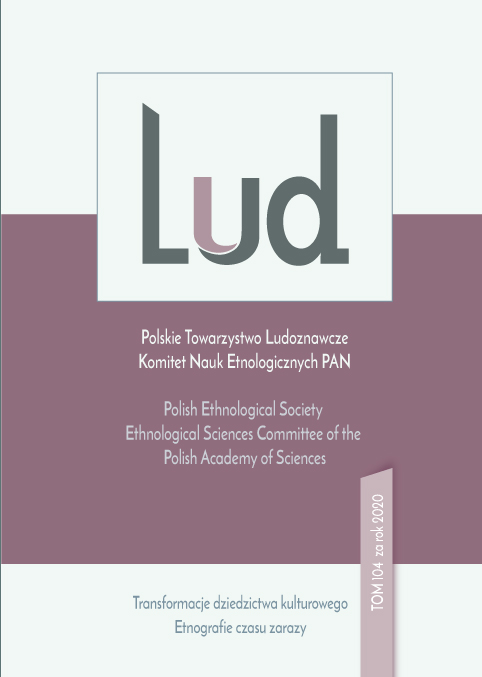The continuous struggle for land and sovereignty – The case of the Mashpee tribe
DOI:
https://doi.org/10.12775/lud104.2020.20Słowa kluczowe
Mashpee Wampanoag Nation, tribal sovereignty, Indigenous land rights, Indigenous identityAbstrakt
The article aims to analyze the Mashpee Wampanoag Nation’s fight for recognition as a tribe and the recent attempts by the US federal government to take their land out of trust. Mashpee’s 1977-1978 lost court case was famously described by James Clifford in a chapter of his book, The Predicament of Culture (1988). The article looks at the continuation of their legal struggle, their recognition as a tribe under the Code of Federal Regulations in 2007 and their recent legal battle to keep their lands. Mashpee’s case is illustrative of the changes in the general perspective of tribal nations’ identities and histories which have taken place in the United States since the 1970s, as reflected in the legal documents analyzed. It also shows that the change in perspective and law itself does not necessarily guarantee sovereignty. Thus, the article takes a legal anthropological approach to the subject.
Bibliografia
Bureau of Indian Affairs. (1994). 25 Code of Federal Regulations, Part 83—Procedures for establishing that an American Indian group exists as an Indian tribe. Final Rule.
https://www.bia.gov/sites/bia.gov/files/assets/as-ia/ofa/admindocs/25CFRPart83_1994_FinalRule.pdf
Bureau of Indian Affairs. (2007). Summary under the criteria and evidence for final determination for federal acknowledgement of the Mashpee Wampanoag Tribal Council Inc. https://www.bia.gov/sites/bia.gov/files/assets/as-ia/ofa/petition/015_mashpe_MA/015_fd.pdf
Cape Cod Times. (2002) Mashpee Wampanoag: A history. Cape Cod Times. Retrieved May
, 2008. http://archive.capecodonline.com/special/tribalrecog/tribal16side.htm
Clifford, J. (1988). The predicament of culture: Twentieth-century ethnography, literature, and art. Cambridge, Mass.: Harvard University Press. DOI: 10.2307/j.ctvjf9x0h
Deloria, Jr. V., & Lytle, C. M. (1983). American Indians, American justice. Austin: University of Texas Press.
Donald L. Carcieri, et al. v. Ken L. Salazar, et al., 555 U.S. 379. (2009). https://caselaw.findlaw.com/us-supreme-court/555/379.html
Gonsalves, S. (2007, February 16). A nation reborn. Cape Cod Times. Retrieved May 18, 2008. http://archive.capecodonline.com/special/tribalrecog/anation16.htm
Jungreis, M. (2020, March 28). Mashpee Wampanoag Tribe is losing its reservation. The
Boston Globe. https://www.bostonglobe.com/2020/03/28/metro/mashpee-wampanoag-tribe-is-losing-its-reservation-leader-says/
Kennedy III, J. (2020a). Kennedy, Haaland file bicameral, bipartisan legal brief to protect
Mashpee Wampanoag land. https://kennedy.house.gov/newsroom/press-releases/kennedy-haaland-file-bicameral-bipartisan-legal-brief-to-protect-mashpee-wampanoag-land
Kennedy III, J. (2020b). Kennedy to Senate: Act now to protect Mashpee Wampanoag
Kennedy III, J. (2020c). Kennedy, Haaland intro bill to protect tribal lands during covid-19
Kickingwoman, K. (2020, June 6). Mashpee Wampanoag: US court ‘stood up for justice’.
Indian Country Today. https://indiancountrytoday.com/news/mashpee-wampanoag-us-court-stood-up-for-justice-HhCupRHu4Eid-1Alpq2zUA
Mashpee Wampanoag Nation. (2020a). Federal Court Rules in Favor of Mashpee
Wampanoag Nation. Mittark. https://mashpeewampanoagtribe-nsn.gov/july-2020-mittark-feature-court
Mashpee Wampanoag Nation. (2020b). Mashpee Wampanoag Tribe Applauds Legislation
Passed by U.S. House to Protect Land. Mittark. https://mashpeewampanoagtribe-nsn.gov/news/2020/7/24/mashpee-wampanoag-tribe-applauds-legislation-passed-by-us-house-to-protect-land?fbclid=IwAR19kwLAEr5ypBlZqDfE8bNUmDtqXyMjQurGlGxCTXaRzSEsihZkBVb-KlQ
Mass Moments. (n.d.). Mashpee Indians sue for recognition. Mass Moments. https://www.massmoments.org/moment-details/mashpee-indians-sue-for-recognition.html
Mashpee Tribe, Plaintiff, Appellant, v. New Seabury Corp. et al. (1979). US Court of Appeals cases and opinions. http://cases.justia.com/us-court-of-appeals/F2/592/575/
Montoya v. United States. (1901). https://law.resource.org/pub/us/case/reporter/F3/386/386.F3d.1271.02-17239.html
O’Brien, Sh. (2007). Native American Policy, in Microsoft Encarta Online Encyclopedia. Retrieved April 29, 2008. http://encarta.msn.com
USET SPF (2020). USET SPF Alert: DOI Withdraws 2014 M-Opinion Providing 2-Part
Carcieri Test, Implements New 4-Part Test. https://www.usetinc.org/wp-content/uploads/2020/03/March11USET-SPF-AlertDOI-Withdraws-2014-M-Opinion.pdf
Vizenor, G. (1994). Manifest Manners: Narratives on Postindian Survivance. Lincoln:
University of Nebraska Press.
Vosk, S. (2007). ‘We’re not going to go second best’ on casino. Cape Cod Times. Retrieved 12 May, 2008. http://archive.capecodonline.com/special/tribalrecog/xwexrenot16.htm
Wheeler-Howard Act of 1934, 48 Stat. 988. (2020). http://aghca.org/wp-content/uploads/2012/07/indianreorganizationact.pdf
Pobrania
Opublikowane
Jak cytować
Numer
Dział
Licencja
1. Autorzy udzielają wydawcy (Polskiemu Towarzystwu Ludoznawczemu) licencji niewyłącznej na korzystanie z utworu w następujących polach eksploatacji:
- utrwalanie Utworu/przedmiotu prawa pokrewnego;
- reprodukowanie (zwielokrotnienie) Utworu/przedmiotu prawa pokrewnego drukiem i techniką cyfrową (ebook, audiobook);
- wprowadzania do obrotu egzemplarzy zwielokrotnionego Utworu/przedmiotu prawa pokrewnego;
- wprowadzenie Utworu/przedmiotu prawa pokrewnego do pamięci komputera;
- rozpowszechnianie utworu w wersji elektronicznej w formule open access na licencji Creative Commons (CC BY - ND 4.0).
2. Autorzy udzielają wydawcy licencji nieodpłatnie.
3. Korzystanie przez wydawcę z utworu na ww. polach nie jest ograniczone czasowo, ilościowo i terytorialnie.
Statystyki
Liczba wyświetleń i pobrań: 673
Liczba cytowań: 0



